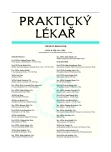-
Medical journals
- Career
Burn-out syndrome in physicians
Authors: R. Ptáček 1; H. Kuželová 1; L. Čeledová 2; Čevela; R 2
Authors‘ workplace: Univerzita Karlova, Praha 1. lékařská fakulta a Všeobecná fakultní nemocnice Psychiatrická klinika Přednosta: prof. MUDr. Jiří Raboch, DrSc. 1; Ministerstvo práce a sociálních věcí Odbor lékařské posudkové služby Ředitel: MUDr. Bc. Rostislav Čevela 2
Published in: Prakt. Lék. 2010; 90(10): 594-596
Category: Various Specialization
Overview
Burnout syndrome is characterized by physical and emotional exhaustion leading to a decrease in work effectiveness. It negatively influences both physical and psychological health. It represents a very serious problem in medicine because burn out syndrome is quite common among physicians and affects patients’ health in addition to the physician’s health.
Key words:
Burn out syndrome, physicians, stress.
Sources
1. Arigoni, F., Bovier, P.A., Mermillod, B. et al. Prevalence of burnout among Swiss cancer clinicians, paediatricians and general practitioners: who are most at risk? Support Care Cancer 2009, 17(1), p. 75-81.
2. Brown, S.D., Goske, M.J., Johnson, C.M. Beyond substance abuse: stress, burnout, and depression as causes of physician impairment and disruptive behavior. J. Am. Coll. Radiol. 2009, 6(7), p. 479-485.
3. Čeledová L., Čevela R. Syndrom vyhoření u lékařů lékařské posudkové služby, jeho příčiny a řešení. Rev. posud. Lék. 2009, 12, 4, s. 75-79.
4. Fahrenkopf, A.M., Sectish, T.C., Barger, L.K. et al. Rates of medication errors among depressed and burnt out residents: prospective cohort study. BMJ 2008, 336, p. 488-91.
4. Graske, J. Improving the mental health of doctors. BMJ, 2003, 327, p. 188.
5. Kebza, V., Šolcová, I. Syndrom vyhoření. Praha: SZÚ, 1998.
6. Kebza, V., Šolcová, I. Burn-out syndrom: teoretická východiska, diagnostické a intervenční možnosti. Československá psychologie 1998, XLII, 5, s. 429-427.
7. Kupka, M. Paliativní péče a riziko syndromu vyhoření. Psychologie 2008, 2, 1, s. 23-35.
8. Peisah, C., Latif, E., Wilhelm, K., Williams, B. Secrets to psychological success: why older doctors might have lower psychological distress and burnout than younger doctors. Aging Ment. Health, 2009, 13(2), p. 300-307.
9. Prins, J. T., Hoekstra-Weebers, J.E.H.M., Gazendam-Donofrio, S.M. et al. Burn-out and engagement among resident doctors in the Netherlands: a national study. Med. Educ. 2010, 44(3), p. 236-247.
10. Seifert B., Vojtíšková J. Syndrom vyhoření a čeští praktičtí lékaři. Prakt. Lék., 2008, 88, 7, s. 398-40
11. Shanafelt, T.D., Balch, C.M., Bechamps, G.J. et al. Burn-out and career satisfaction among American surgeons. Ann. Surg. 2009, 250(3), p. 463-471.
12. Soler, J.K., Yaman, H., Esteva, M. et al. Burn-out in European family doctors: the EGPRN study. Fam. Pract. 2008, 25(4), p. 245-265.
13. Trufelli, D.C., Bensi, C.G., Garcia, J.B. et al. Burn-out in cancer professionals: a systematic review and meta-analysis. Eur. J. Cancer Care. 2008, 17(6), p. 524-531.
Labels
General practitioner for children and adolescents General practitioner for adults
Article was published inGeneral Practitioner

2010 Issue 10-
All articles in this issue
- Burn-out syndrome in physicians
- Measuring the quality of life of family caregivers
- Some special questions dealing with the institution of advance directives
- Professional satisfaction of physicians and nurses in general practice settings
- Alcohol consumption and its situation in the Czech Republic
- Adrenal carcinoma – pitfalls of diagnosis
- Current review of the diagnosis and treatment of pancreatic cancer
-
Evolution and evolutionary theory for physicians
X.: Self-awareness. - Continuing postgraduate education of general practitioners and E-learning in the Czech Republic
-
What should a general practitioner know about drinking water?
Part II. Health risks associated with water - Dyspnoea in elderly subjects caused by respiratory diseases
- General Practitioner
- Journal archive
- Current issue
- Online only
- About the journal
Most read in this issue- Dyspnoea in elderly subjects caused by respiratory diseases
- Burn-out syndrome in physicians
- Current review of the diagnosis and treatment of pancreatic cancer
- Continuing postgraduate education of general practitioners and E-learning in the Czech Republic
Login#ADS_BOTTOM_SCRIPTS#Forgotten passwordEnter the email address that you registered with. We will send you instructions on how to set a new password.
- Career

